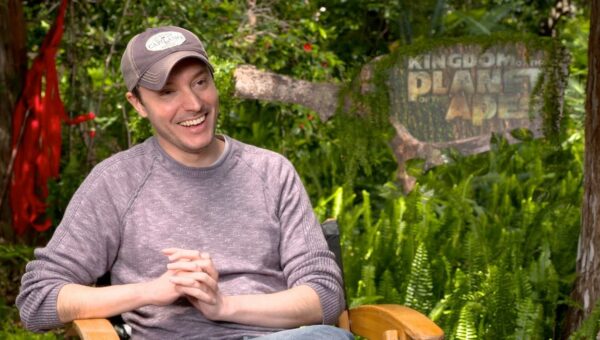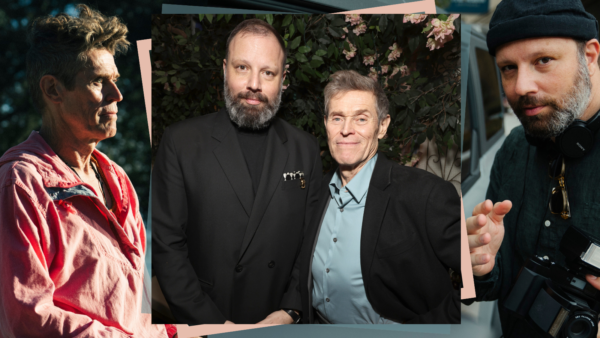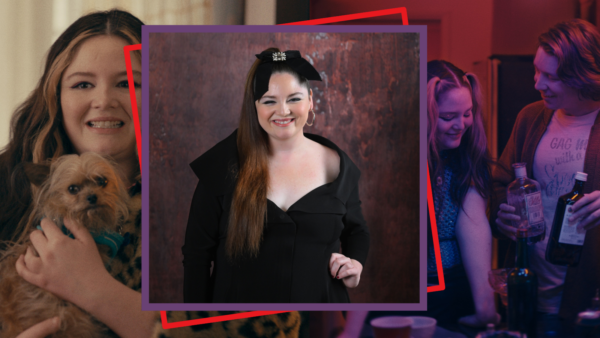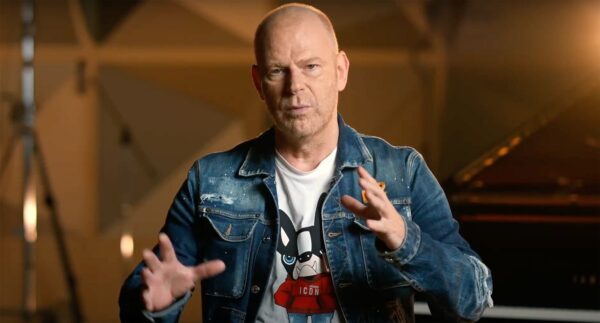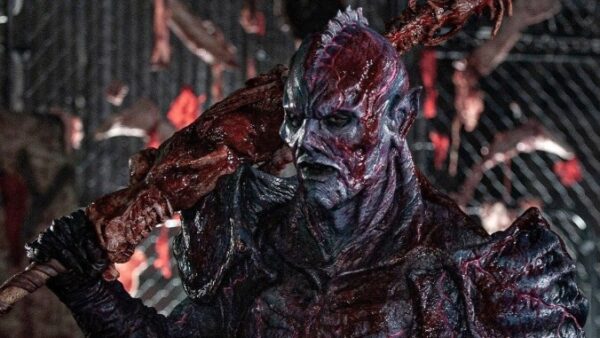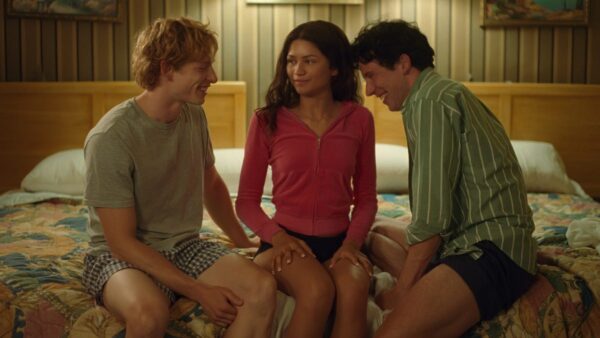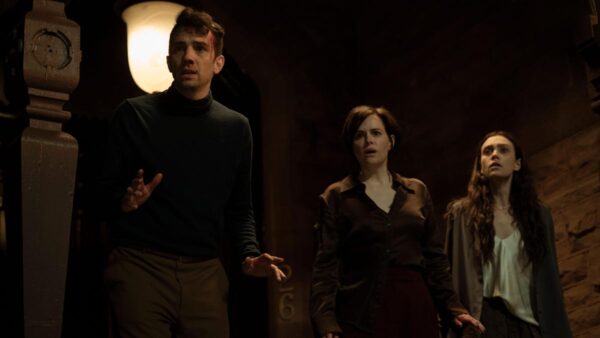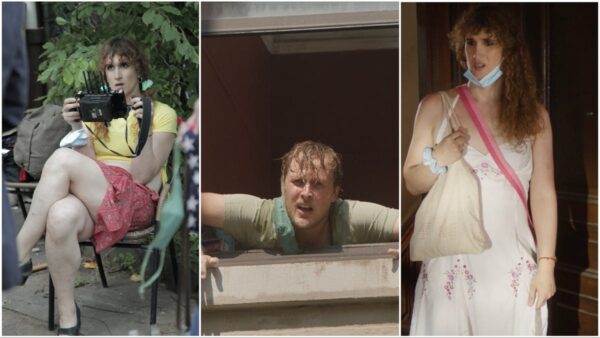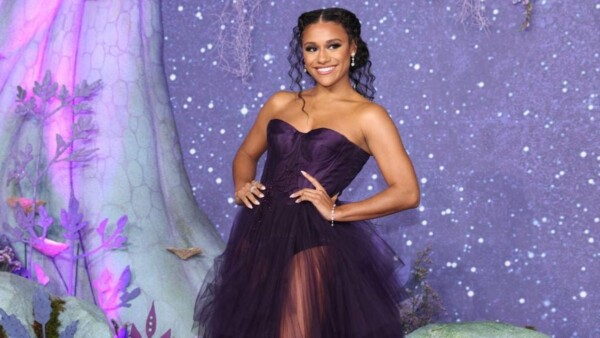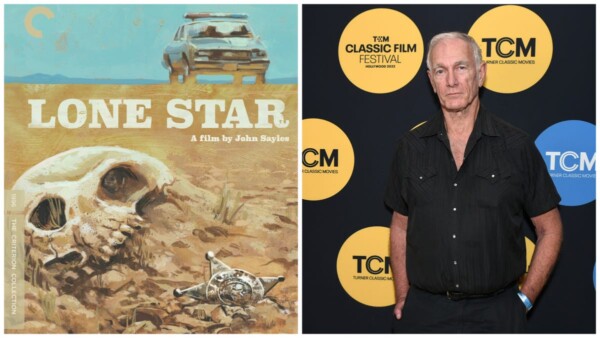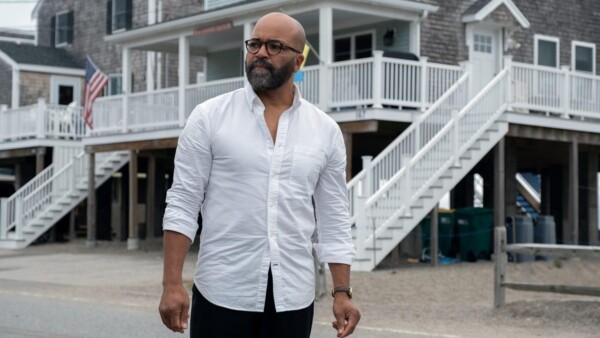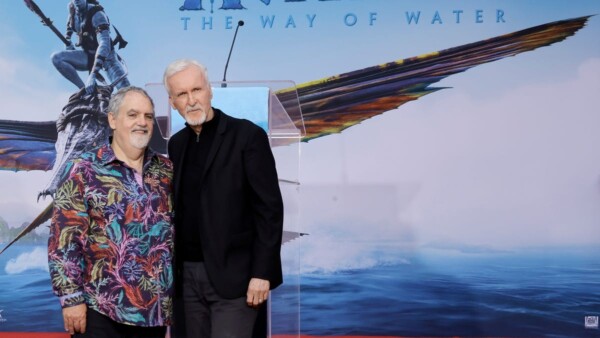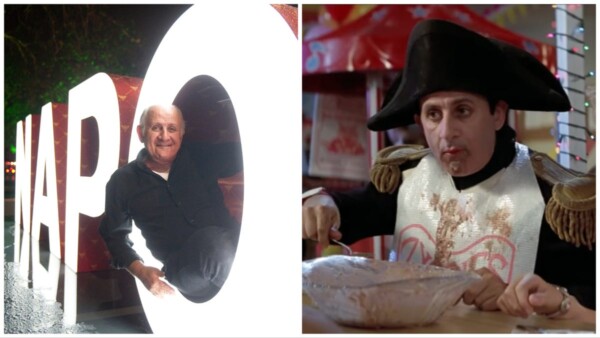The actor: A longtime stalwart of British stage and screen who’s hit the buzzworthy TV jackpot over the last few years, Harriet Walter has done everything from playing a detective on Law & Order: UK to rickrolling the world with the cast of Ted Lasso. She plays a less-than-stellar mother in the latter, something that she’s also done—with some reservations about typecasting—in both Succession and The Last Duel. She plays an acceptance of the status quo with aplomb in films like Atonement, keeping a stiff upper lip even as she plays the icy wall off which the story often ricochets.
We talked to Walter about her recent hot streak, her concerns over being typecast as a certain type of older woman, and her seven seconds of Star Wars stardom.
The Last Duel (2021)—“Nicole de Carrouges”
The A.V. Club: Your character is absolutely merciless in this movie, and she also has no eyebrows. Where do you think she was coming from? Where did that level of self-preservation come from?
Harriet Walter: I think she represents the norm of women at the time, because there was this rule of men and you didn’t challenge it. You had no economic independence outside of the man you were married to or the man you were daughter to. That was your destiny. Particularly in the upper echelons of society you were a kind of trophy or pawn to be shifted around on a chessboard. She has been indoctrinated with that by her mother and her mother’s mother and everyone around. That’s the culture she’s living in.
So when Marguerite challenges that and brings up all the echoes of [Nicole’s] own past, which I don’t really want to reveal in case people haven’t seen the movie, but a large window opens for a second into what Nicole’s past experiences are. She has the opposite reaction to what I would call a feminist reaction of support because she feels, “I had to do it this way, so you can bloody well do it that way. Why are you challenging what I have had to put my whole life behind?”
It’s quite a common story. I think even now when certain women don’t help other women, there’s a sense of, “I had it hard, so why should I let you have it soft?” Do you know what I mean? Marguerite challenging the status quo calls in question why I didn’t challenge the status quo. And, you know, she’s old enough to have solidified in her beliefs. They’re really solid beliefs that that’s the way the world works and you’d do best to keep your head down and get on with it.
The lack of eyebrows, I thought, was a token gesture, partly because I really wanted to have that look because a lot of medieval iconography from church paintings and things has these very plucked eyebrows and high foreheads. I thought that’s what the beauty criterion was of the day. She’s somebody who, you know, that was when she was beautiful. That was her fashion when she was young, and she’s maintaining it because she’s keeping up. She’s frozen in time. That was the kind of feeling I wanted to give her.
AVC: She also seems to view their marriage as very transactional, and if so, then she has no skin in the game for Marguerite. She’s there for her son, period.
HW: Exactly. It’s very much to protect her son. As she sees it, the whole deal has come about because Marguerite has kicked up a fuss and put her son’s life in danger. That’s so central.
I remember [director] Ridley [Scott] saying, “Remember you hate her,” and I would say, “But I’m not sure I hate her.” It’s not so much about another mother-in-law and daughter-in-law clash, which was Ridley’s version. I was much more concerned with showing that tension comes because of a certain sense of ownership of the man, her son, who stands opposed to a much younger man. You know, “I can criticize him, but you can’t. I know my son’s been a doofus on all sorts of fronts, but I’m the one to tell him that.”
So, yes, there’s a fear and anger involved in my feelings towards her. But there were little nuances and signs of solidarity that actually had to be cut out of the movie because of the length and also just because it clashed with the general theme, which was that there was no ally for Marguerite. So the tiny little nuanced scenes where I am a little bit motherly and help her out, they cut out.
AVC: Does not having an heir put her in danger? If he dies and the estate moves on to someone else, is she out on her own?
HW: I think she’s safe for her lifetime because there are ways you can legally keep tenure. I’ve been shoved out of the family home into some dower house already, anyway. I’ve only got five servants, so I’m already living very much down.
But yes, there’s the idea that the son carries forward the family name and the family honor and everything that my husband acquired, and I’m seeing my son throw it all away. Plus, we had this heir who died. His little boy died as a child, and so, of course, I’m in favor of him remarrying and having a second chance at that, but I’m knitting a little bonnet for the baby and kind of go, “Have a baby for God’s sake.”
AVC: And it certainly isn’t his fault that they haven’t had one yet.
HW: Exactly.
AVC: Speaking of motherly figures, this was not the first time you worked with Jodie Comer. You knew each other from Killing Eve. What was it like to dive into that world as Dasha?
HW: Dive is the right word, really, because I’d watched it as an audience member and that’s always so strange when you’ve seen a show as part of an audience and suddenly you have this surreal, “Hey, I’m in the frame” feeling as though you’ve leapt into a Bugs Bunny cartoon. But it was kind of perfect because I knew enough people in the cast to feel not too intimidated. I had such an extraordinary character and there was nobody saying, “you’ve got to be like this, you’ve got to fit into that” because Dasha just doesn’t fit in. So it was up to me what I created, really.
In a way, I think a lot of the inspiration for that and a lot of the creation of that character came from the design of the clothes and the wig from the hair designer. Of course, we had discussions about it, but the [costume] designer, Sam Perry, came up with this tracksuit look with Dasha written across the back on all her clothes. For somebody who’s supposed to be working slightly undercover, it’s a bit of a giveaway, you know?
There was a sense in which she was referring to this slightly Eastern European palette of pinks and purples and leopard skin and stuff like that. That, to me, was a great inspiration because it took me right out of my normal if I have a normal and it did a lot of the work for me. Sometimes your look can do quite a lot for you.
Succession (2018-present)—“Lady Caroline Collingwood”
AVC: Lady Caroline Collingwood is another interesting mother figure. It couldn’t have been easy for her to be married to Logan and to have her kids off in New York.
HW: Thank you. That’s a rare comment. I usually get, “What a hyena. Now we understand why the kids are the way they are.” And I go, “Yeah, and Logan doesn’t explain why they are the way they are?”
Also, do the math. I must have been around for at least 10 years to have those three kids, and they all have very strong American accents. So I conclude from that that I lived in America rather than they lived in Britain. I took my life over there and did the thing you’re supposed to do.
I have to say that I’ve created a backstory that [Succession creator] Jesse [Armstrong] approves of because I had to fill in the dots. He has to look over everything, though, and I only have my character to look after. So I created a sort of backstory where she’s certainly no saint, but you do understand that she was badly parented and she has no clue about being a mother, really. She handed everything off to nannies, but she thinks she loves her kids and she has her cozy moments with them. When anything gets profound and real and they really need her, a kind of shutter goes down because that’s what she knows, because that’s what happened to her when she was a kid.
Catch up with the Roys ahead of Succession’s 3rd season premiere
I know that sounds like a bit of a get-out, but it is a pattern we see all over the place. She doesn’t really know how to be intimate, and she doesn’t know how to handle demands. And so it’s not that she’s cold. She’s not cold, she’s just incredibly shut back. She thinks she’s being warm and cozy and calls them by nicknames and chucks them under the chin, but then in a defensive way, her tongue just lashes out. This is her defense.
I also think she gets very bored. She has a very small, short boredom threshold, so she creates a stir. She creates trouble. She creates things to happen. She says provocative things, partly because she knows that her kids can give her exactly the same back.
I don’t think she’d tread on them if she knew how vulnerable they were. I don’t think she would do that. I don’t think she’s an unkind, horrible person. I think she’s just a very damaged person.
AVC: It’s interesting you say that she was poorly parented because you can see that she probably thinks she’s doing a better job than her parents did, which she probably is. Also, the lashing out could be something she’s done since she was a girl just to get attention from those same parents.
HW: All of that is a defense and it’s also fun. I think she married Logan in the first place because she went to America for some fun because England was pretty boring at that time. The social echelon she comes from is very stuffy, and so I think she got into the drug scene and she partied a lot and met this genius rich guy called Logan Roy, and he wanted a bit of class in his life or whatever it was. They took off and he gave her the means to a lifestyle she could really get off on. When she had the kids, it was kind of boring, so she said, “I’m not going to stay around in the nursery all day. You go and play. I’m going out to a party.” I just can see it.
AVC: She also keeps that distance, like when Kendall came to her and she said “I don’t really want to talk about it.” That’s also sort of a way to say, “If things get too hairy with us, maybe we won’t see each other as much, so if we can keep this like surface level relationship with each other. We can still maintain our relationship.”
HW: Exactly. I think because they don’t see one another very often, she doesn’t want any time that they do have together to get nasty.
There’s a couple of little hints, too. In season one, there was a little scene that got cut. Kendall says he’s “been seeing a shrink and he says to forgive you.” And I say, “Okay.” So I know that every time Kendall comes to me, I’m going to get some kind of psychiatric babble about how what a bad mother I’ve been. I think he’s trying to say, “Let’s have a showdown. I’ve got to earnestly tell you what a shit mother you’ve been.” Do you see what I mean? So that’s why it’s an issue.
Similarly, when the other two come in the scene before that, when she gives them the partridge or quail with shot in it, she’s very defensive when her daughter says, “How are things?” It’s like, if you ask me that sort of question, she immediately thinks her kids are on the attack, and she wants to get them first.
Ted Lasso (2020-present)—“Deborah”
AVC: You were part of a pivotal episode of one of the most recent episodes of Ted Lasso, which was the big church funeral scene. What was it like filming in that church and all the stuff that was going on in that building?
HW: That was extraordinary. Again, it was a visit into a show that I’d seen, and suddenly [Hannah Waddingham is] my daughter and I was there.
At first I was a little worried because I hadn’t seen all the scripts. I was a little worried that there’s a scene where I say, “I’ll cook you something nice tonight” and then don’t show up. I thought, “Oh, are we repeating history here?” So I was very determined to make her different, to have her come from a different social class, to come from a different kind of vulnerability. It seemed to work that you could still have that kind of a daughter and that kind of a mother that would work together.
We learn in that pivotal episode that she’s been a doormat to her husband. And once again, it’s slightly an echo of The Last Duel where the older woman is saying, “I put up with it” and the younger one is saying, “Why, what does it get you?” And that is very much today’s story. That’s what’s happening. I find that theme is being played out in lots of stuff I’m doing.
The church scene, I mean, Hannah Waddingham is just a phenomenon. She’s a musical theater actress here in London, and she’s much more, too. It was just wonderful to see her get up and do that kind of dramatic holding back that turns into a musical, emotional thing in the middle of a ha ha ha comic series.
Hannah Waddingham on Ted Lasso season two
Jason [Sudeikis has] been brilliant to introduce that much more serious element and to be able to do the ride himself between being hilarious and really touching. I thought it was a really brave episode that says, “Okay guys, we’ve had a lot of fun but let’s make these people even more real.” It felt very organic. It felt right. None of them were being shoehorned in. They seemed to be coming into a situation that someone had died, and that’s a trigger point for all sorts of relationship crises. I thought that was really believable.
AVC: When anybody dies in real life, you can see such a different aspect of people. Grief makes people do weird stuff. People are in some sense the purest version of themselves.
HW: Sometimes, yes. You don’t go to funerals and hear people say, “He was shit at this and he was shit at that.” Everybody says the best thing they can say because there’s a kind of closure. If there was something wrong, it’s over now. You’ve got to move on.
I find it very interesting that Rebecca can’t do that. She can’t say anything. She has to sing it, and I love that because I think that’s that’s so true to life as well. So she shifts a different gear.
What struck me was also the support of the team. They got all dressed up and showed up for somebody they didn’t know. They didn’t know her father, presumably, but they show up for her because funerals are for the people who are left behind.
Herself (2020)—“Peggy”
AVC: In an interview that you did with The Guardian, you said something to the effect of how you often get asked to play a mom or older woman who puts a spanner in the works or shows how the main character got where they were. But you also said that you sometimes fear you’re reinforcing a negative image of older women. Can you talk about that? I can see what you mean, especially the image of older upper middle or upper class British women.
HW: There are many layers and I hesitate to talk about it because I don’t want to sound like I’m complaining, because I’m so pleased I keep working. But at the same time, there are so many prejudices against women, so many prejudices against older women and fear of age, and so many prejudices about upper class women in our country. We like people who don’t make it in our country. It’s not the American culture. If you’ve had privilege, people want you to lose. They want you to fall.
Partly because of the way I look and sound, this is the reality of casting, I’m not going to play the cuddly working-class granny. That can be another kind of stereotype that isn’t helpful to older people. Basically, my mission in life is to say that older people are older people. They are still people. They’re exactly the people they were, but they have grown older and they have lived longer. There’s no way they haven’t been and nothing they don’t know. There is that aspect, including knowing that they’re not relevant anymore, knowing that they don’t matter anymore. They have a humility. I’m generalizing, but what I’m saying is there are 100 million assets to an older person.
Functionally in drama, an older woman—if she’s there at all—is often the brick wall. The drama happens when the young person meets the brick wall and meets opposition. I did a movie very recently called Herself, it’s a beautiful Irish film. I play an older woman who is the agent of help, and she understands the young woman and gives her agency. Why not have more of that?
I knew Ruby Wax and I’d met Tracey Ullman, I think. They knew that I was happy to fool around in real life and that I wasn’t as serious as some people thought I was. I think they liked to use the fact that if I was known at all, it was as a serious actress and so they were putting that twist on the character in that sketch. Ruby was infiltrating this serious acting situation, and we were all being a bit subversive. Imagine my delight, because I really was pigeonholed into the National Theater and to be able to send it up was this kind of light relief.
HW: A crucial seven seconds in my career.
AVC: Hey, those seven seconds will get you fan conventions for the rest of your life.
HW: Absolutely. I get more stuff from that. Somebody told me, “You will have been seen by more people in those seven seconds than in everything you’ve done to date added up together.” I don’t know how they calculate that, but that’s pretty extraordinary.
Like so many people I know, you don’t have any idea how you got it or why you. You know that there was a machine behind the scenes pulling strings saying, “We’ve got to have this doctor.” It’s part of the absolute lottery.
The very first time I saw a script—because you don’t get sent a script and in your audition, you don’t do anything from the actual film, so I didn’t even know what I was auditioning for. When I got the job and I went on for a costume check or makeup check or whatever, this woman came up to me said, “Do you want your lines?” I said, “Oh yeah, that would be great,” and she gave me this page, which was almost empty. I looked around and said, “Did you drop some?” But no, that was it. Originally it just said—it didn’t name Chewbacca—it just said, “Somebody speaks, and then you say, ‘You are most welcome.’” That’s four words.
So I thought, “What am I being brought here for? This is crazy.” I was actually quite disappointed, I have to admit. So I went for my makeup thing and my clothes test and I was reeling from this. I said, “I’ve only got four words and anybody can say them.”
The costume designer knew me a little bit and he was big pals with [director] J.J. [Abrams] and he said, “You’re coming with me.” He went and talked to J.J. and I don’t know what he said, but then I got invited to meet J.J. on the set. I wasn’t due to work that day. I was just coming for costume fitting. And so I met J.J., who’s adorable, and he said, “We’ll find something. We’ll get something else going on for you to say. Don’t worry. We’ll see on the day.”
I looked around and there was the costume designer just kind of [nods], “Leave it with me.” And so I got seven words instead or 11 words or whatever it was, but they were fun words. They were words I could play with and do something with. J.J. was just always enthusiastic and energetic, and I know he got it. But anyway, it was actually a really pleasurable job to do.
AVC: You never know. You could get called back. They’ll say, “We’re making a Dr. Kalonia movie!”
HW: Well, somebody’s got to get sick!
Der obige Text ist eine maschinelle Übersetzung. Quelle: https://www.avclub.com/harriet-walter-on-succession-ted-lasso-and-her-7-seco-1847912002?rand=21961





